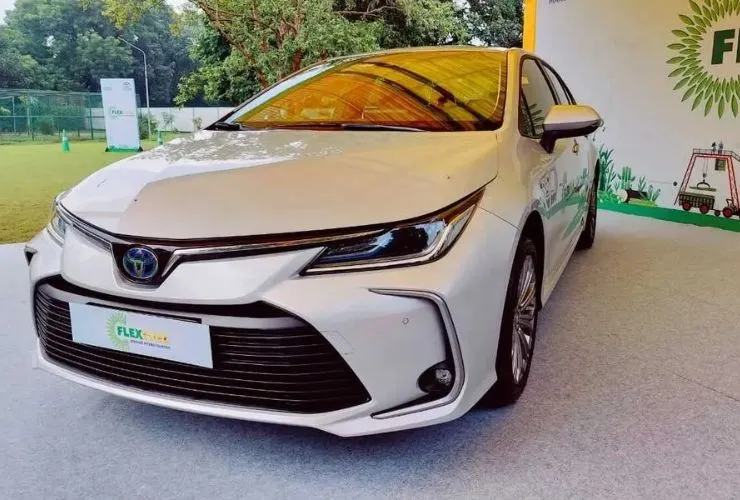The Indian government is actively promoting flex and alternative fuels. Union Minister Nitin Gadkari, on Monday, urged state finance ministers to lower the GST slabs on flex-fuel vehicles. The Goods and Service Tax on flex-fuel cars and scooters could be lowered to 12% at the next GST Council meeting. The minister made this request at IFGE’s India Bio-Energy & Tech Expo. Lowering the slabs will make way for easier adoptions, and will also help manufacturers to come up with cost-efficient products. This seems to be a promotional strategy similar to the one we had seen with EVs in India.
The Road Transport and Highways minister seems to be quite serious about the tax cut. He has reportedly had the Union finance minister agree to talk to and persuade state finance ministers to support the initiative. Furthermore, he has had meetings with UP Chief Minister Yogi Adityanath and Ajit Pawar regarding the same.
Currently, the government levies 28% GST on ICE vehicles including hybrids and flex-fuel models. Electric vehicles, on the other hand, have just 5% GST. Bringing the bar down on flex-fuel vehicles will make them a lot cheaper, and boost adoption. Furthermore, manufacturers like Bajaj and Hero have a strong focus on two-wheeler exports. Lowering the slabs will encourage them to experiment more with flex-fuel tech, perfect it and export flex-fuel vehicles.
What Are Flex Fuel Vehicles?
Unlike regular vehicles, Flex Fuel vehicles use a mix of petrol and a sustainable additive- mostly ethanol. The ratio of these can be varied (is flexible) and thus the name ‘flex-fuel’. Unlike petrol, Ethanol can be obtained from multiple sources and through various processes. This also contributes to the name. The amount of Ethanol used in the blend usually ranges between 10% (E10) and 85% (E85). Vehicles these days offer support for E20 fuels. Flex fuel vehicles will also have support for various Ethanol-petrol mixtures, and will be more versatile. They are also considered cleaner and more sustainable than conventional vehicles.
Flex fuel engines do not differ too much from normal petrol engines. They get enhancements that make them adapt to various levels of Ethanol in fuel, and deliver satisfactory performance. These include special sensors and fuel delivery systems. This setup automatically detects the Ethanol: petrol ratio of the fuel used and adapts accordingly to deliver optimum combustion and performance.

Flex fuel vehicles are greener, as they reduce Carbon footprint, and emit less NOx and SOx gasses. Concerns over tailpipe emissions are on the rise in the country. We see the government aggressively promoting (the less practical) EVs, and advocating CNG. The latter was recently in the news for an unpleasant reason.
The lab that had exposed VW Dieselgate scam recently released a report that says CNG is not Green. Even worse, CNG exhausts emit more NOx content, and the same can cause cancer and other chronic lung diseases. Thus, flex-fuel vehicles, if democratised and priced competitively in the future, could become convenient, clean alternatives for regular petrol vehicles.
There are a few key demerits and drawbacks to flex-fuel vehicles. They tend to return a drop in fuel efficiency and reduced peak power output when running on high Ethanol blends. These are also more expensive to maintain, due to Ethanol’s corrosive nature. Plus, Ethanol production and blending facilities are small in number, at present. More of these need to be set up if the technology is to be democratised.

Vision To Reduce Oil Imports
The strong push for flex fuel adoption has geo-political and financial roots as well. Reliance on bio fuels and flex fuels will help bring down petrol and diesel consumption. Relying less on petrol will allow the country to reduce its oil purchases from other countries. This is expected to have a positive impact on the Indian economy. At present, India’s annual oil imports are worth Rs 22 lakh crore. Capping this will likely strengthen the economy.
Hybrid Needs A Cut Too!
Gadkari also bets big on hybrids. In March this year, he sought tax relaxation on hybrid vehicles, at News18’s Rising Bharat Summit 2024. The present GST on hybrids is 28%. However, with various other taxes and cesses on top, the net taxation amounts to around 48%! EVs on the other hand, have GST slabs of just 5%. Gadkari in a statement, remarked that this disparity is unfair and that hybrids deserve more praise and consideration. He had also requested a relaxation that would bring the slab to 12% for hybrids.
If realised, the 12% slab will greatly benefit the innovations that are already underway in the ‘hybrid’ space, and will allow manufacturers to come up with cost-effective solutions and profitable products.
The post Nitin Gadkari To State Govts: Cut GST On Flex Fuel Cars first appeared on Cartoq.
Source link

